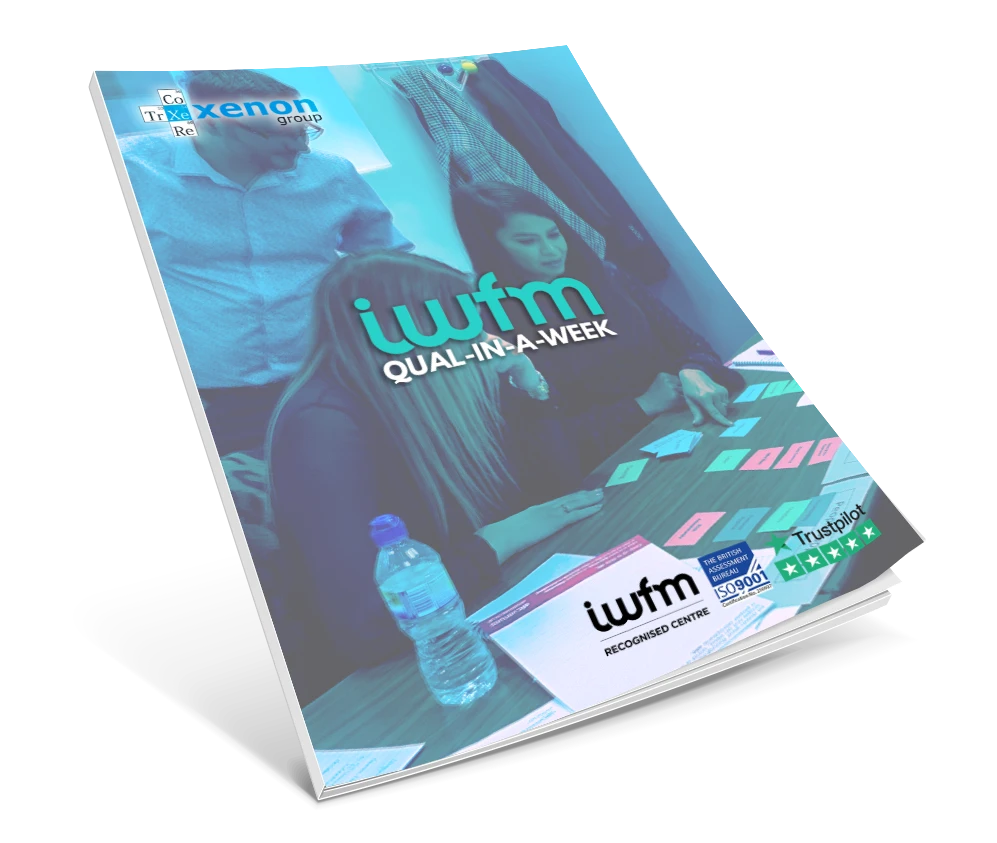Hi there,
This week we’ll be looking at the second way that FM can support core business, and it’s a big one! This week, we’re talking about reducing costs.
But before we begin, we wanted to give you advance notice of something that’ll be happening over the following couple of weeks.
After a long, post-COVID hiatus, we’re relaunching our IWFM Qual-in-a-Week course.
It’s an intensive, in-person course that can allow you to achieve an IWFM Level 4 Award, including all tuition and assessment, in just one week.
So over the next couple of weeks, we’ll be breaking from our usual weekly schedule to give you more information about the course and its benefits.
If it sounds like something you’d be interested in, click the big red button below and you’ll be added to a list to receive updates about course dates and, crucially, when enrolment opens.
In the meantime, we’ll be sending out some additional e-mails over the coming days to tell you more about the Qual-in-a-Week.
Anyway, enough of that for now – click the big red button if you’re interested, but for now, let’s get on with this week’s topic.
Reducing Costs
Did you know that buildings and facilities often account for some of the largest costs to a business?
In fact, facilities costs are often second only to the cost of employing staff.
With that in mind, FMs often find themselves responsible for trying to reduce the costs to a business and increasing profitability.
It is part of the role of the Facilities Manager to be looking at ways that costs can be reduced. The lower the costs, the more profit an organisation will make, or the more money will be available to invest back into the education of children if you work in a school or the care of the sick if you work in a hospital.
You get the idea!
Of course, at all times the services you provide must be fit for purpose and meet all legislative requirements but you can be innovative in your thinking in ways to reduce costs.
An example might be the use of space within your buildings. The cost of floor space is expensive and if you have areas within your buildings that are not been used to their fullest extent, money is being wasted.
This has become a major factor in recent times with the proliferation of home-working. The debate about how much flexibility to give staff is ongoing and varies from one organisation to the next, but whatever the outcome, it will be down to you as the FM to accommodate it.
There are all sorts of ways to reduce costs, but always remember that this should be balanced with providing a quality service as well as looking after the needs of your people.
For example, one former student of ours was able to renegotiate her cleaning contract to ensure that cleaning staff were paid the London Living Wage, without any increase to the cost of the contract.
Although the nominal amount paid by the company remained the same, the increase in staff pay led to a better, more reliable service from the contractor.
So you can see that reducing costs isn’t as black and white as it sounds. It doesn’t have to mean slashing budgets and reducing service levels, and with a bit of creativity can actually lead to a better service and a positive impact on the organisation – beyond the simple aim of saving money.
Have a great week!
Chris and the Xenon Group team
P.S. If you haven’t already studied or started studying for an IWFM qualification, which will cover topics like this in depth and fully assess your understanding, you may want to have a look at our guide to the IWFM Qualifications which will give you a full breakdown of how they work and what’s involved in the different levels. You can download it here.
P.P.S. If you’re already considering taking a qualification but don’t know which level to go for, a good starting point is our One-Minute-Leveller tool, which will ask you a few questions and give you a recommendation based on the result. You can access it here.



